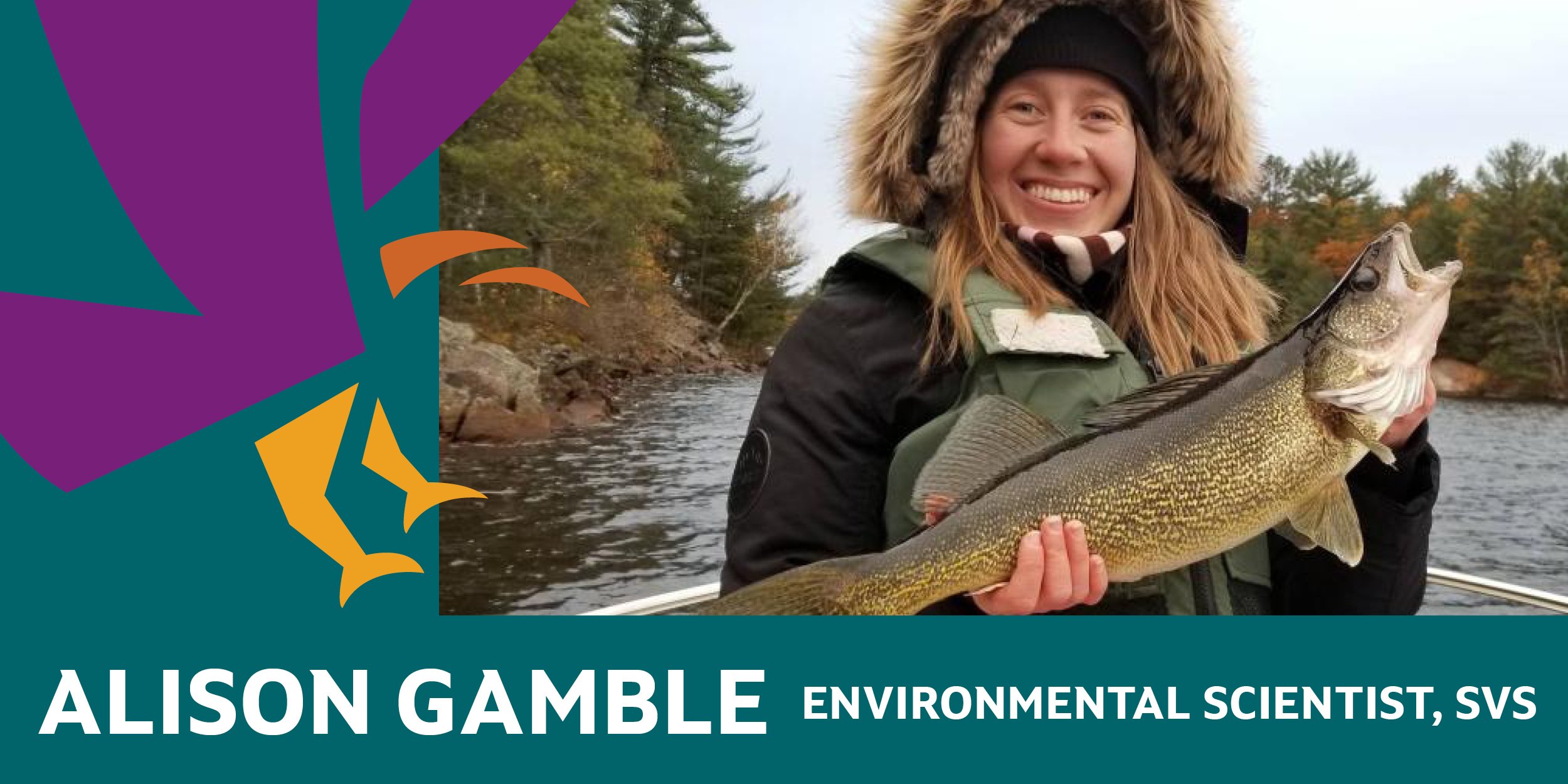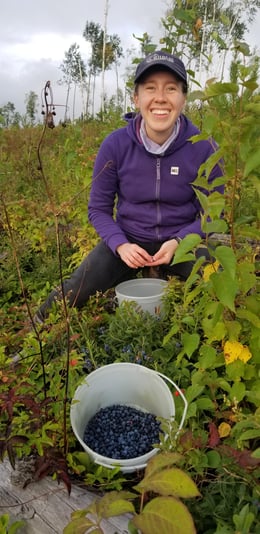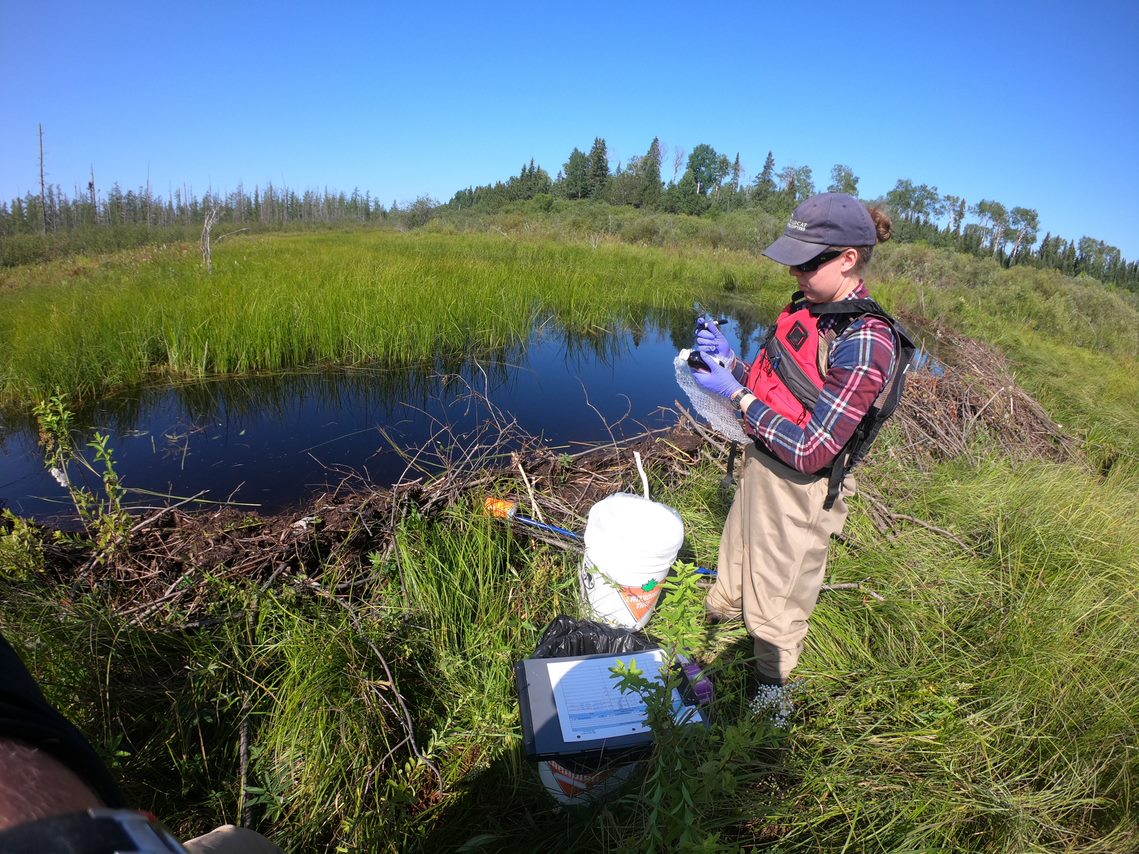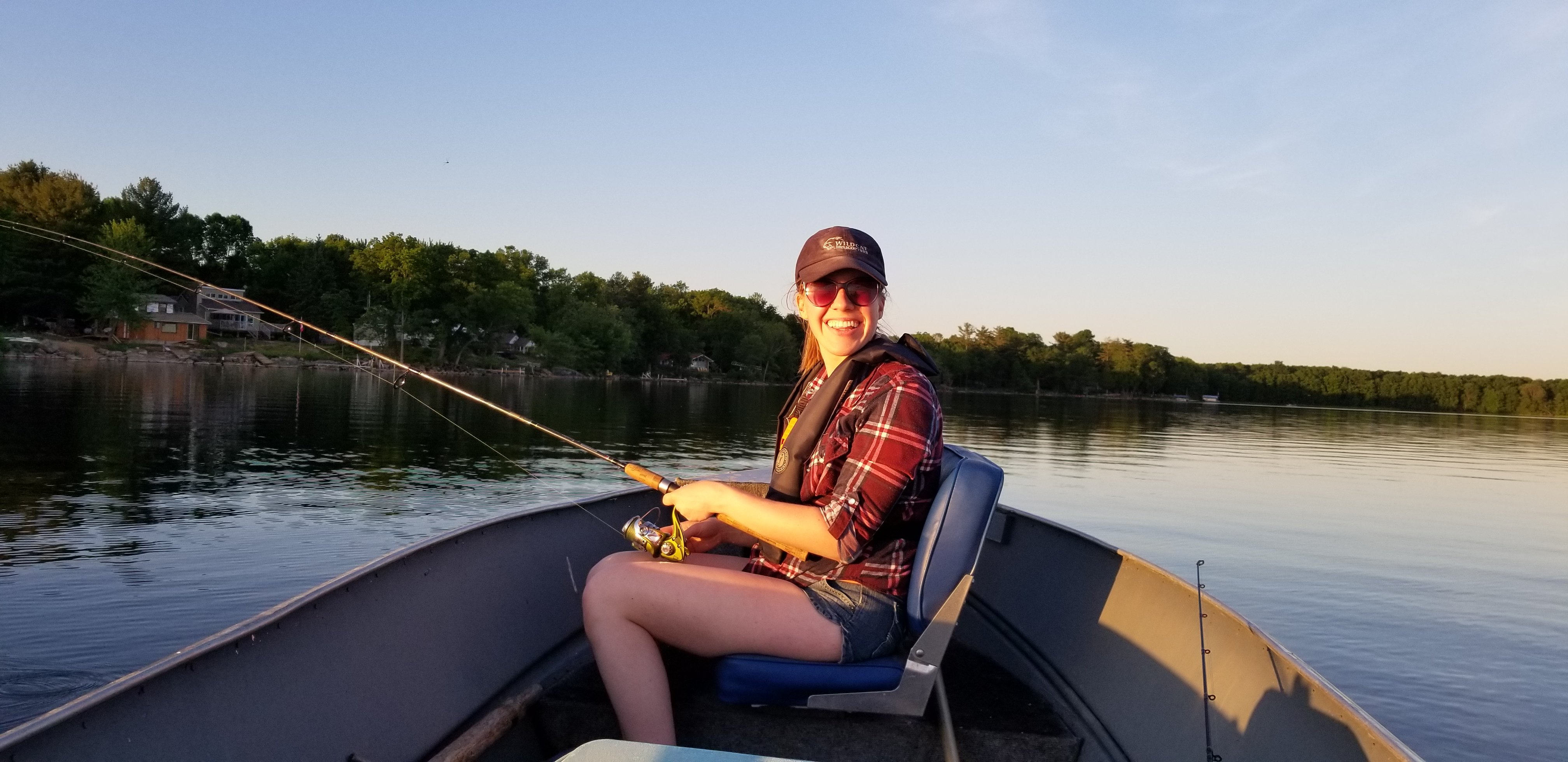
Welcome to the next post in our series that celebrates Indigenous professionals with careers in STEAM! SVS is committed to supporting Indigenous youth who are pursuing careers in STEAM (science, technology, engineering, math, and the arts, architecture and agriculture - all areas that Indigenous peoples have been innovators in for thousands of years, as described by IndigeSTEAM. We support through our scholarship program (with Indspire as well as others), but also through the mentorship and inspiration of our staff members.
In this series, we share the personal essays of our talented team members about their very individual journeys to their current careers. Today's contributor is Alison Gamble.
Ali G, as we affectionately call her, is a long-term supporter of encouraging youth in STEAM. She volunteers as a mentor for environmental science students at the University of Guelph, has previously participated in career fairs and high school events to encourage youth to pursue STEAM careers, and is an advocate for women and minority groups in science.
Meet
Alison Gamble, M.ES., C.Chem
Environmental Scientist, Shared Value Solutions
"My parents made sure to teach me the important role that each of us play in caring for the Earth, by demonstrating responsible behaviour and always encouraging me to do my part...Little did I know at the time that all of these experiences and lessons, and the connection to my Métis ancestry, would eventually be such an important part of my career journey." 
Growing up in Northwestern Ontario, I spent a lot of time exploring and enjoying the outdoors with my family. I have fond memories of many hours spent fishing and picking berries, all while enjoying quality time together admiring and appreciating the wonders of nature (hello, Sunset Country!). It was here where many fundamental principles were instilled in me from a young age – don’t take more than you need, always make sure that your actions won’t have negative impacts, and don’t leave a trace.
My parents made sure to teach me the important role that each of us play in caring for the Earth, by demonstrating responsible behaviour and always encouraging me to do my part. I remember having regular family “garbage pick-up days”, where we would collect litter that others had left in our neighbourhood. Little did I know at the time that all of these experiences and lessons, and the connection to my Métis ancestry, would eventually be such an important part of my career journey.
Throughout school I excelled and enjoyed a variety of subjects, but was always particularly drawn to the maths and sciences. I was amazed by how these subjects could explain the world around me, including the things not visible to the naked eye, and enjoyed how the sciences fuelled my inquisitive nature.

As I reached the end of high school, I felt very stressed and anxious about not being able to decide what career path I wanted to pursue. Being from a small town, I found it very overwhelming to think that there were likely many jobs and career options that I had never even dreamed of, because the variety of professional mentors I saw in my community were more limited than what you would see in a city.
After spending many hours of deliberation on the lake with a fishing rod in hand, I decided that I would choose a degree in one of the three major science disciplines. I (wrongfully) assumed that having seasonal allergies meant that I shouldn’t study biology (living things have pollen and dander, after all), and I wasn’t confident in the career options that would be available with a physics degree – so I decided to go to post-secondary school to study chemistry.
My undergrad degree in chemistry was challenging, but also extremely rewarding. There were definitely some difficult subjects that required lots of dedication and studying in order to comprehend. But being able to understand how such big interactions between tiny atoms and molecules drives our world was very inspiring. Plus, it was fun to make interesting compounds in the lab! However, there’s always more to an education than what you learn in books.

Moving from a small northern town to a city in Southern Ontario, I often felt like a fish out of water, and it took me a long time to adjust to the new lifestyle. I began to notice how much I missed spending time in the Northern wilderness, and how I had taken it for granted for so many years. I was grateful for my University’s Aboriginal Resource Centre, which felt like a safe haven where I could connect with other students and staff that were able to relate to how I was feeling (not to mention how delicious the lunches were on Soup and Bannock Wednesday!).
In addition, being a female in a physical science program sometimes came with challenges. There were instances where my male colleagues were treated and spoken to much differently than I was, which was frustrating at best. Once I even had a male classmate whom I didn’t know ask if I needed him to tutor me because I must be struggling, being a girl and all. The look on his face was priceless when I shared that my current average in the course was 30% higher than his.
In my last year of undergrad, I once again was in a position where I didn’t know what my next career step should be. In that year, I had completed an independent research project, which I didn’t particularly enjoy. Although I found the experience mentally and emotionally draining at the time, it helped me realize that spending all day every day in a lab setting does not fuel my soul. It also helped me conclude that I did not want to spend the rest of my life doing lab work, and that pursuing a research-based master’s program may not be the best option for me personally.
Many of my university classmates had spent their summers working at jobs that were directly relevant to their field of study, which seemed to help them know exactly what they wanted to pursue after they graduated. However, each summer I had opted to return home to the north, both to save money and to be able to spend time with my family and friends after being gone for most of the year. During those summers, I worked as a flight coordinator for the provincial forest fire management program.
I often worried that this choice would put me at a disadvantage to my fellow students when it came time to apply for full time science jobs, as they had more network connections in the science sector and more real-life scientist experience on their resumes. I now appreciate that the experience I had gained in a seemingly unrelated position had actually well prepared me for my future career aspirations by fostering my transferable “soft” skills. The camaraderie of the forest fire management program also cultivated the development of many long-lasting friendships and mentorships that I am forever grateful for.
After graduating with my Bachelor’s degree in chemistry, I was at a loss for what to do next, so I opted to work a contract to support the forest fire management program for a year and a half. During that time, I was living back in Northwestern Ontario and spent a lot of time thinking about what my next step would be. After being re-immersed in the north and spending lots of time fishing and exploring again, I was reminded of my childhood and those important lessons and values that were now engrained in me. Eventually, I came to the realization that I needed to pursue an environmental career in order to feel fulfilled and like I’m contributing positively to the world, and my Métis community, in a way that is meaningful to me.
After lots of research and conversations with former professors and colleagues in their networks, I discovered that I could pursue a Master’s degree in Environmental Sciences that was course based with a field component, as opposed to a traditional thesis-based master’s program. This seemed ideal for my situation, given that my undergrad degree was in a different discipline and I knew that I did not want to pursue a career in academia.
During my Master’s program, I was fortunate to be able to tailor the courses and field training so that it aligned with my interests and could support a career path in environmental chemistry, focusing on contaminated sites. After graduating, I worked for a consulting firm as an environmental remediation scientist, and simultaneously pursued a professional designation as a Chartered Chemist in Ontario.
Nearly four years ago, I decided to join the team at Shared Value Solutions as an environmental scientist, where my main focus is environmental chemistry. Working as a consultant is a great fit for me, as I’m able to make meaningful connections with clients and feel like I am making a tangible positive contribution to society. I also love the fast pace and variety that comes with consulting, as it means that there is never a dull moment and a variety of tasks to put my attention towards.
.jpg?width=1440&name=6931EC25-66C4-4297-A85E-9A9396C8035D(1).jpg)
More about Alison:
Alison is an environmental scientist and project manager with a background in environmental chemistry, contaminated sites, and waste management. She is a registered Chartered Chemist with the Association of the Chemical Profession of Ontario, and is a member of the Society of Environmental Toxicology and Chemistry, where she sits on the international steering committee for Indigenous Knowledge and Values. In 2019, she co-chaired a session at the North America Conference for the Society of Environmental Toxicology and Chemistry, titled “Western Research Methods and Indigenous Knowledge: Collaborative Approaches Towards Environmental Quality and Integrity.”
Alison has experience in designing, leading, and reporting on environmental monitoring programs that involve sampling groundwater, surface water, sediment, benthic macroinvertebrates, and leachate. She has a strong background in planning and facilitating community meetings, engagement sessions, and workshops. Alison is experienced in conducting third party reviews of technical reports and documents. She has experience in developing and delivering curricular for professional development and adult learning courses, including topics relevant to Indigenous Guardians Programs.
Alison holds a master’s degree in environmental sciences and a bachelor’s degree in chemistry, both from the University of Guelph. She is very proud of her Métis citizenship, and has been fishing ever since she could hold a rod and reel and foraging wild edibles since she started walking. Combined with a deep scientific curiosity, this has led Alison to become passionate about protecting traditional ways of life through conservation and remediation efforts. When she’s not outside fishing, hiking, canoeing, and picking berries, she can be found baking delicious treats and channelling her creativity through arts, crafts, and sewing projects.
Like what you're reading? Get the latest blog posts, Indigenous funding announcements and stories of resilience from across Turtle Island in your inbox every two weeks in our newsletter, the Talon!
About Us: Shared Value Solutions
We are an Canadian B Corp, and we assist Indigenous communities with support throughout regulatory processes surrounding major development projects like mines, hydroelectric facilities, transmission lines, highway expansions, oil and gas pipelines, natural resource transport applications and nuclear power.
We have deep context and experience behind the recommendations we provide, having worked for our clients on almost every major project in Canada over the last 10 years. For us, it’s all about building long-term relationships with our clients. We want to get to know you and what you want to do so we can help you move your plans forward.
- Impact Benefit Agreement Negotiation Support
- Technical Reviews and Regulatory Process Support
- Community and Economic Development Planning
- Indigenous Knowledge and Land Use Studies
- Environmental Monitoring
- Guardians Program Development
- Climate Change Readiness
- GIS and Mapping

